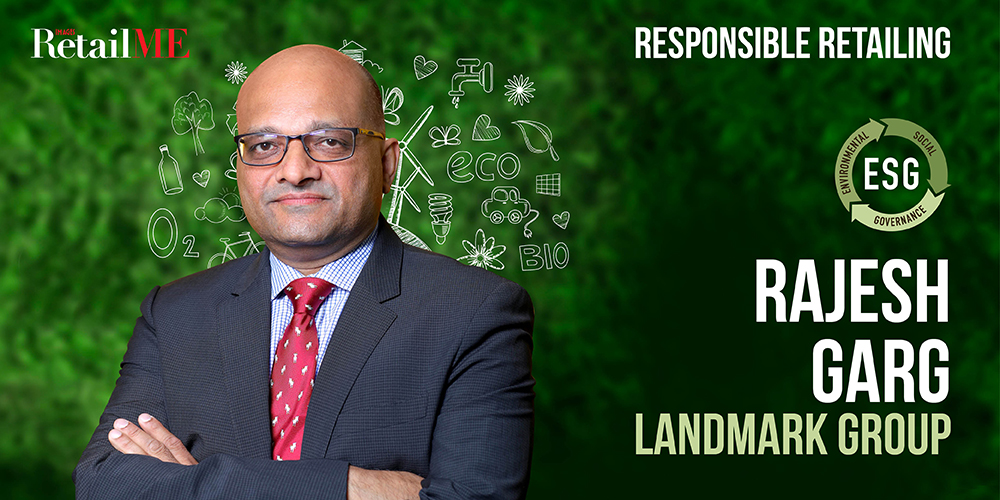
Rajesh Garg, Group Chief Financial Officer, Landmark Group
Starting with some milestones achieved by UAE-headquartered regional retail conglomerate Landmark Group.
However, there are several challenges to overcome. Most of which are applicable across the industry, not just the Landmark Group.
One of them being the fact thatfashion retail is among the top five polluters globally. Around 120 billion new garments are made every year of which 30% are worn only once and only 1% is recycled. Enough waste is generated by the fast furniture retail segment to go to the moon and back every six months. These are alarming insights, even though 56% Arab youth are expected to shun a brand that’s not environmentally responsible.
Raising a serious question, Rajesh Garg, Group Chief Financial Officer, Landmark Group who also leads sustainability observed, “Are business models at odds with sustainability?”
An even bigger question: Is the retail industry working together to create a path towards circularity?
“The short answer is that there is not enough collaboration yet, although awareness is rising which is great because every player needs to first get a grip on where they stand,” Garg responded. “With COP28 coming up it is a great opportunity to form some meaningful collaborations to drive desired outcomes. This is a great opportunity to come together as an industry and catalyse change.”
Asked if regulations are strong enough or there is need for better policymaking around ESG priorities, he said, “Not just in our region but globally there is need for better policymaking and well thought out regulations which must be aligned with the underlying infrastructure for recycling etc, availability of products that meet sustainability standards as well as awareness among consumers about the importance of sustainable practices.”
Cradle-to-Gate-to-Grave
Over the past 50 years of operating in the Middle East, Landmark Group brands have stood for affordable and accessible products for all.
“Looking at the next 50, we would like our brands to be sustainable, affordable and accessible for all. We strongly believe that it’s much easier to fix the planet than ruin it,” Garg emphasised.
Aligned with this goal the Group has developed its sustainability strategy focused on people and the planet to create a positive social impact across its value chain – starting with farmers who grow the raw materials to suppliers, followed by shipping to retail associates and finally customers.
“Fortunately, the planet part has been integral in the way our brands operate,” Garg said. “Since product plays such a key role in our business – and because manufacturing is largely done outside the region – we have released chemical management guidelines that our suppliers must adhere to, also closely focusing on working conditions in factories.”
Notably, Landmark Group has maximised its solar energy capacity of 8.3 megawatt as per current guidelines in the UAE. The Group now has an additional 2.1 MWp of solar rooftop and carport systems across four prominent sites in the UAE, representing a meaningful share of its energy needs in the emirates.
Commenting on sustainable operations to become a circular and climate positive company Garg said, “We’ve remained steadfast in our commitment towards saving energy consumption, reducing waste across our facilities. We are making our stores eco-efficient with energy savings up to ~10%. Looking ahead, we want to leverage electrification of logistics and greening of shipping.”
When it comes to sustainable customers, a big question is what happens once a product is bought? How many times can the product be washed? How long can the product be used and at the end of lifecycle how can it be responsibly disposed? Thereafter, what happens at the landfill?
“In view of this scenario, work is in progress to renew our ‘take back’ programme to responsibly recycle products,” Garg shared.
So, what does the future hold?
“To understand our footprint was itself a challenge,” Garg admitted. “Along the way we realised that it’s difficult to manage what’s not being measured. So, we created an end-to-end bottoms-up, by material, carbon accounting model for ~40,000 product types. This has not only enhanced our understanding of our carbon footprint but also the ability to neutralise it. We will continue to refine this model because we firmly believe that within next few years a company’s carbon statement will become more crucial than the financial statement.”
Overall, as a region, MENA is known for high energy consumption. The per capita energy consumption footprint of the UAE and other GCC countries is three times that of the global average. On an average, almost 20 tons of greenhouse gas is emitted by every resident in the UAE versus the global average of 7 tons.
“While awareness has been behind the curve, it is shifting rapidly,” Garg concluded.
Notifications